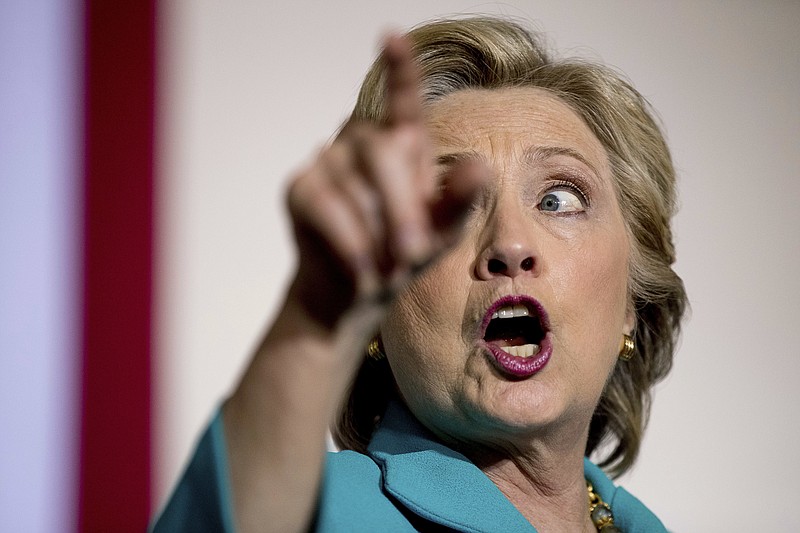In early July, Democrats were full of praise for FBI Director James Comey, who found no reason to charge presidential candidate Hillary Clinton for her intentional use of a private email server during her days of serving the public as secretary of state under President Barack Obama.
After he concluded she was "extremely careless" but that her case should not be prosecuted, her campaign said he "has rarely been questioned" during his career in law enforcement and was "well-respected." It later said the FBI director's explanations "shut the door on any remaining conspiracy theories once and for all."
Clinton press secretary Brian Fallon called Republican presidential candidate Donald Trump's accusation about Comey "pathetic," and Democratic mouthpiece Donna Brazile tweeted that Republicans grilling Comey were "damaging the rule of law."
Now that the FBI director has reopened his investigation with the revelation of more Clinton emails, Democrats have suddenly turned on the man for whom they had so much praise three months ago.
His actions, they said over the weekend, were "unbelievable," "puzzling," "a terrible lapse in judgment" and might "influence the outcome of an election."
Might influence the outcome of an election?
Yes, many thought that's what Comey's action did in July. It quieted but did not end one of the many scandals associated with Clinton, who was distrusted at the time by more than 60 percent of the electorate. It quelled questions about what was certainly unethical and most likely illegal but definitely an action that was taken with the same hubris to public scrutiny she and her husband have shown throughout their careers.
The upshot of the latest action will not be known until either the election is over or until Comey makes his next pronouncement. Having ruffled the feathers of the administration that employs him, no one should be surprised if the FBI director sometime in the next week says a preliminary look at the emails offers no red flags.
What's at stake over all this? Only a lot.
* Clinton is ahead by only a small percentage in a number of battleground states. Voters, who have never considered her trustworthiness (though it's hard to believe there could be any), may decide that should be a factor in their decision.
* Trump, based on the most recent information, could decide to skip his usual bombast and get more detailed in his plans for the country. Many voters who prefer substance to bloviation have liked what they've heard when he's done that.
* With millions of early votes already in the books, some voters will have buyer's remorse. Voters in about a fifth of the states - not Tennessee, Georgia or Alabama - are allowed to change their votes, some all the way up until Election Day.
* The balance of power in the U.S. Senate could be affected. Currently, races in seven states could go either way. Prolonged talk of any email probe could tip most of them Republicans' way, allowing the party to keep its majority.
The weekend Democratic punditry over Comey's decision was interesting and funny and, frankly, pathetic to behold.
Among its conclusions were of a "dumbed down" electorate (which should believe Clinton has never done anything wrong), of Clinton's corruption being nothing compared to Trump (who, incidentally, has never held public office), of Clinton being fearless in the face of the email release (by someone appointed by her own party), of a multitude of lawsuits pursuing Trump, of "poor uneducated white people" voting Republican, of Clinton's commanding lead (despite tightening polls) and, perhaps the most outrageous, of people changing their votes to Clinton because of the email release decision by Comey (who is not on the ballot).
In fact, one devastating poll - if any poll can be believed - indicated 34 percent of voters said the new information made them less likely to vote for Clinton.
What will happen next Tuesday is anyone's guess, but the bottom line is that only one person set these events into motion. It wasn't Trump, it wasn't George W. Bush, it wasn't Comey, it wasn't "poor uneducated white people" and it wasn't the electorate as a whole. It was Hillary Clinton. Without her decision to satisfy her convenience and her desire for secrecy and then to obfuscate about the emails and server and classified designations, none of this would have happened.
Perhaps the worst idea about the election, though, came from The Onion, the satirical news source whose headlines bear no resemblance to fact but often makes us wish they did.
"The FEC (Federal Election Commission)," the headline read, "extends election by 7 months to give nation chance to better get to know candidates."
If we had to endure seven months to get to know any more about the candidates, we'd all want to leave the country.
